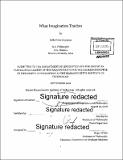What imagination teaches
Author(s)
Ortiz-Hinojosa, Sofia
DownloadFull printable version (6.599Mb)
Other Contributors
Massachusetts Institute of Technology. Department of Linguistics and Philosophy.
Advisor
Alex Byrne.
Terms of use
Metadata
Show full item recordAbstract
An investigation of the imagination, as both a mental process and a capacity to acquire knowledge about the world and other minds. It is argued that imagination is a unique mental process, whose primary feature is the capacity to construct and manipulate sets of mental representations. This feature unifies the diverse activities we call imaginings into a single class. In addition, use of this capacity in a rule-based way, under the constraint of prior beliefs, can help us acquire knowledge of everyday facts. An examination is then made into the limitations of such a capacity. It is argued that imagination can aid in rational decision-making, even in cases which may involve substantial transformation of the agent. Finally, a case is made that we can improve our capacity to gain knowledge of the mental states of others by careful application of imagination.
Description
Thesis: Ph. D., Massachusetts Institute of Technology, Department of Linguistics and Philosophy, 2016. Cataloged from PDF version of thesis. Includes bibliographical references.
Date issued
2016Department
Massachusetts Institute of Technology. Department of Linguistics and PhilosophyPublisher
Massachusetts Institute of Technology
Keywords
Linguistics and Philosophy.